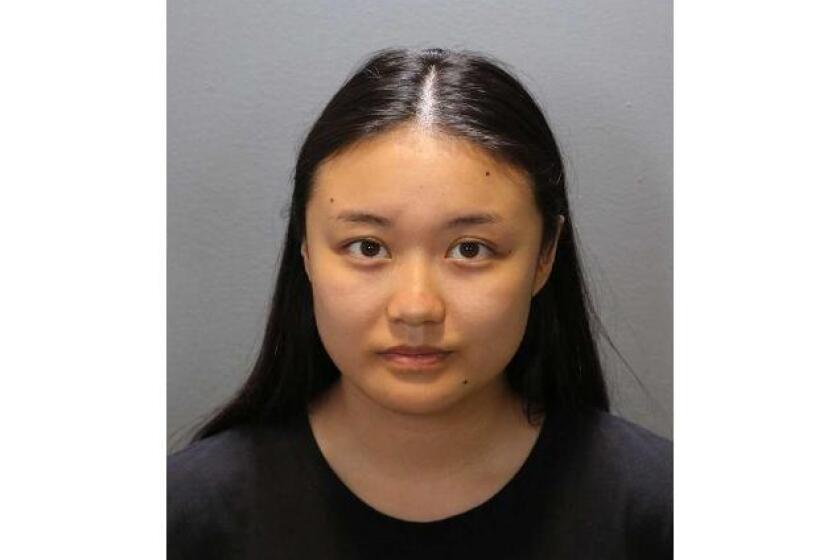Judge Resumes Control of Suit Against LAPD
After vigorously asserting his right to take over a controversial lawsuit alleging discrimination by the Los Angeles Police Department, a federal judge resumed authority over the case Tuesday, then said he was in no hurry to resolve it.
U.S. District Judge William D. Keller, one of the most conservative jurists on the Los Angeles federal bench, did not rule out approving a proposed agreement that would impose new hiring and promotion goals for women and Asian Americans and would extend existing goals for African Americans and Latinos.
But Keller, whose moves to take the case over have heartened opponents of the proposed agreement, signaled that he is in no hurry to lend his support to the deal, which would bind the LAPD for 18 years.
“I’m not precluding the signing of a consent decree, no way am I doing that,” the judge said. “I want to undertake a measured review of the consent decree.”
The City Council approved a portion of a proposed consent decree last month. Among other things, the agreement would require the LAPD to try to build a police force that mirrors the gender and ethnic makeup of the civilian county labor force. Women today make up about 17% of the police force; under the decree, the federally sanctioned goal would change to 43%. Likewise, the department would be required to try to increase the representation of Latinos and Asian Americans, both of whom are underrepresented when compared to the local labor pool.
But first Keller must approve the deal, and his backing is by no means assured.
On Tuesday, he indicated that the proposal forwarded for judicial approval “may present substantial constitutional questions.”
Before addressing those questions, Keller said, he must decide whether other groups beyond the plaintiffs in the case and the city attorney’s office have the right to be represented in future hearings. The Los Angeles Police Protective League, the police union representing rank-and-file officers, has asked to be included, as has the Individual Rights Foundation, which is representing an LAPD lieutenant.
The Protective League has not opposed all aspects of the proposed agreement, but has objected to its exclusion from the talks that led up to the deal. In a motion seeking to intervene, the league argued that its members could be hurt by some parts of the proposal, which it said “threatens to impair or impede the hard-won fruits of collective bargaining . . . between the city of Los Angeles and the league on behalf of its more than 9,000 officers.”
The foundation argued that City Council members approved the proposed agreement in order to “evade and circumvent the expected passage of Proposition 209,” a statewide ballot measure banning most public affirmative action programs. The measure was approved by California voters this month.
On behalf of an LAPD lieutenant, the foundation echoed the league’s concerns about the secretiveness of the negotiations and charged that Lt. Richard Dyer’s interests were not being protected by the parties to the deal.
Lawyers for the foundation have charged that the proposed agreement amounts to imposition of hiring quotas, a contention that the city attorney’s office and plaintiffs reject. The city would not be punished for failing to achieve the goals in the proposed decree so long as it could show that it was pursuing them in good faith.
*
The judge did not rule on whether those groups would be allowed to intervene, but he set Dec. 12 as the date to hear arguments on that question. If either or both are allowed to join in the case, it would undoubtedly complicate talks aimed at settling the remaining issues regarding the lawsuit. The city attorney’s office and the plaintiffs have reached agreement on many points, but the other organizations would bring their own views and objections.
Keller’s reentry into the case surprised lawyers for the plaintiffs and the city attorney, who had agreed to send all future hearings to Magistrate Judge Rosalyn Chapman. They notified Keller of that move in a motion filed Oct. 15, but Keller said he did not notice the passage explaining the move at the time.
It was not until Keller read about it in the newspaper that he realized the two sides had moved the case to another jurist. Last week, he summoned the lawyers to his courtroom to inform them that he was taking the case back, in part because it involved sensitive issues and legal questions that required a District Court judge to review.
At first, the lawyers asked for time to consider whether to oppose that move, but they decided against challenging Keller’s authority. As a result, his resumption of the case Tuesday was not contested by either side.
Nevertheless, Keller seemed agitated, brusquely reading a three-page order explaining his rationale for retaking the case and frequently interrupting himself to emphasize certain points. At the end of the hearing, Keller had his clerk pass out copies of the order to ensure that he was quoted accurately.
More to Read
Start your day right
Sign up for Essential California for news, features and recommendations from the L.A. Times and beyond in your inbox six days a week.
You may occasionally receive promotional content from the Los Angeles Times.







